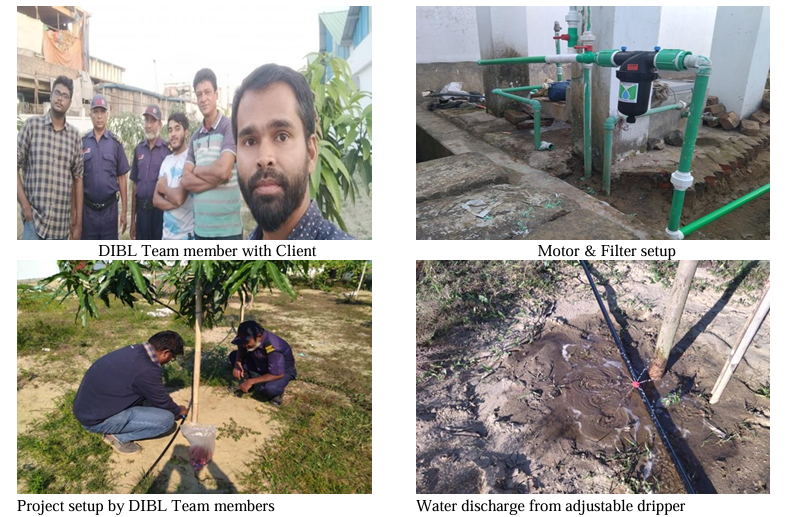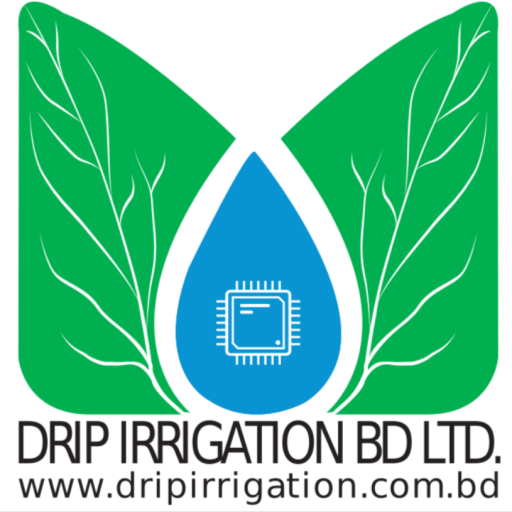Introduction: Imagine lush green mango orchards in Bangladesh, heavy with fruit, even during the drier months. For many farmers, this dream often clashes with the reality of water scarcity and inefficient irrigation methods. But what if there was a way to ensure consistent hydration, boost yields, and save precious resources? Let’s delve into a recent project where Drip Irrigation BD Ltd. (DIBL) brought its innovative solutions to a local mango orchard, transforming the way these delicious fruits are cultivated.

Project Details:
This impactful project involved the implementation of a state-of-the-art drip irrigation system in a vibrant mango orchard located in [Specify District, Bangladesh – e.g., Rajshahi District, Bangladesh]. The initiative was spearheaded by dedicated farmers in collaboration with the expert team at Drip Irrigation BD Ltd. (DIBL). The primary challenge being addressed was the inefficient use of traditional flood irrigation, which often leads to water wastage, uneven distribution, and increased labor costs. The installed drip irrigation system is remarkably user-friendly, designed for easy setup. Farmers have the flexibility to either manage the installation themselves or enlist the help of a local plumber or technician. Rest assured, DIBL’s experienced engineers are always on hand to provide comprehensive support and guidance should any difficulties arise.
Key Benefits for Farmers & Entrepreneurs:
- Water Efficiency: Traditional flood irrigation can waste up to 50% of water due to evaporation, runoff, and deep percolation. Drip irrigation, however, delivers water directly to the root zone, reducing water usage by as much as 60% (Source: Based on general studies on drip irrigation efficiency). One farmer commented, “Before, I spent hours flooding my fields, and still, some trees suffered. Now, with drip irrigation, every tree gets the precise amount it needs, and I’ve noticed a significant drop in my water bills.”
- Crop Yield Improvement: Mangoes, like many fruit-bearing trees, thrive with consistent and precise watering. Drip irrigation ensures optimal soil moisture, leading to healthier trees and a substantial increase in fruit yield. Farmers have reported yield increases of up to 30% in similar projects (Source: Agricultural research data on fruit crop irrigation).
- Cost Savings: Beyond reduced water consumption, drip irrigation significantly cuts down on other operational costs. Farmers spend less on fuel for pumps and experience lower fertilizer leaching due to targeted water delivery. “I used to buy so much fertilizer, and it felt like half of it washed away. Now, I use less fertilizer, and my mangoes are healthier than ever,” shared a beneficiary farmer.
- Automation & Smart Features: Modern drip irrigation systems can be equipped with timers and even integrated with IoT devices for remote monitoring and control. This automation minimizes the need for constant manual intervention, freeing up farmers’ time for other essential tasks.
- Long-Term Sustainability: Drip irrigation is an environmentally friendly approach. By delivering water directly to the roots, it minimizes surface runoff and soil erosion, preserving the precious topsoil for future cultivation. This sustainable practice contributes to the long-term health and productivity of the land.
- Weed Control: The localized application of water in drip irrigation significantly reduces surface moisture in areas away from the plants. This drier environment inhibits weed seed germination and growth, leading to less competition for nutrients and reducing the need for herbicides and manual weeding. Farmers have noted a visible decrease in weed problems since adopting drip irrigation.
- Time and Labor Savings: The automated nature of drip irrigation, coupled with the reduced need for manual weeding and watering, translates to significant savings in both time and labor. Farmers can allocate their valuable time to other crucial farm management activities.
- Initial Investment vs. Long-Term Savings: While the initial investment in a drip irrigation system might seem higher than traditional methods, the long-term savings in water costs, fertilizer use, labor, and increased yields far outweigh the initial expenditure. Consider the story of Mr. Karim from a neighboring village who initially hesitated due to the cost but now proudly showcases his thriving, water-efficient farm, a testament to the long-term economic benefits.
Real-Life Impact & Success Stories:
Mr. Rahman, a mango farmer in [Specify District], shared his experience: “Before DIBL’s drip irrigation system, I was constantly worried about water availability, especially during the dry season. My mango yields were inconsistent, and I spent a lot of money on water and labor. Now, my orchard is consistently green, my mangoes are bigger and more plentiful, and I’ve seen a significant increase in my profits. It’s truly a game-changer.” While specific government incentives weren’t highlighted in this particular project, DIBL actively informs farmers about any available subsidies and helps them navigate the application process.
Inspiration & Business Opportunities:
The success of this mango orchard project serves as an inspiration for other farmers and entrepreneurs in Bangladesh facing similar irrigation challenges. Implementing drip irrigation can unlock the potential for higher yields, reduced costs, and sustainable farming practices. The growing demand for efficient irrigation solutions also presents significant business opportunities in the agribusiness sector. New startups can explore providing installation, maintenance, and consultancy services for drip irrigation systems, especially in partnership with established companies like Drip Irrigation BD Ltd. (DIBL).
Geo-Location Details:
Project Location: Mango Orchard, [Specify Exact Location/Farm Name if available, otherwise use District], Bangladesh.
Coordinates: [Insert Google Maps Coordinates if available, otherwise omit].
Call to Action & Company Contact Details:
Ready to transform your farm with a cost-effective and efficient irrigation system? Contact us today to learn how Drip Irrigation BD Ltd. (DIBL) can help you achieve higher yields and sustainable water management!
Contact Us: Email: info@dripirrigationbd.com Website: www.dripirrigation.com.bd
Head Office: Address: 2C/81, Parijat Apartment, North Adabor, Shyamoli, Dhaka-1207 Phone: 01324-445400 | Email: dibldhaka400@gmail.com Representative: Sadman Sarar (Public Relations Officer)
Branches: Dhaka: Address: 2C/81, Parijat Apartment, North Adabor, Shyamoli, Dhaka-1207, Phone: 01324-445411, Email: dibldhaka411@gmail.com, Representative: Tanbirul Islam, Assistant Engineer Chattogram: Address: A3/1st floor, Nazma Tower, Munni Commissioner Goli, Oxygen, Chattogram-4214, Phone: 01324-445395, Email: diblctg399@gmail.com, Representative: Mobinul Islam, Assistant Engineer Bogura: Address: 4A, Twin Brother Phulbari Plaza, Santhahar Road, Charmatha, Bogura-5800, Phone: 01324-445385, Email: diblbogura385@gmail.com, Representative: Md. Samsuzzaman Sumon, Assistant Director Jashore: Phone: 01324-445390, Email: dibljashore390@gmail.com, Representative: Md. Masud Rana, Assistant Engineer Sylhet: Address: Queen’s tower, lift (4-A), near by over bridg, kadamtoli, Sylhet, Phone: +880 1919-751845, Representative: Asadul Islam Shahoria, Sub-Assistant Engineer.
{ “@context”: “https://schema.org”, “@type”: “FAQPage”, “mainEntity”: [ { “@type”: “Question”, “name”: “What are the main benefits of using drip irrigation for mango cultivation?”, “acceptedAnswer”: { “@type”: “Answer”, “text”: “Drip irrigation offers several key advantages for mango cultivation, including significantly reduced water usage (by up to 60% compared to traditional methods), leading to lower water bills and conservation of resources. It ensures consistent and precise water delivery directly to the root zone, promoting healthier tree growth and increasing fruit yield by potentially 30% or more. Farmers also experience substantial cost savings on fertilizers due to reduced leaching, and a decrease in labor required for manual watering. The localized watering also helps in suppressing weed growth, reducing the need for herbicides. Overall, it contributes to more sustainable and profitable mango farming.” } }, { “@type”: “Question”, “name”: “How easy is it to set up a drip irrigation system for a mango orchard?”, “acceptedAnswer”: { “@type”: “Answer”, “text”: “Setting up a drip irrigation system is designed to be relatively straightforward. Farmers have the option to install it themselves with the provided guidelines, or they can hire a local plumber or technician for assistance. Drip Irrigation BD Ltd. (DIBL) also provides comprehensive support from their experienced engineers, who are available to offer guidance and troubleshoot any challenges during the installation process. The systems are designed with user-friendliness in mind, making the transition from traditional methods easier for farmers.” } }, { “@type”: “Question”, “name”: “Is drip irrigation expensive to implement initially?”, “acceptedAnswer”: { “@type”: “Answer”, “text”: “While the initial investment for a drip irrigation system might be higher compared to traditional flood irrigation, it’s crucial to consider the long-term financial benefits. The savings accrued from significantly reduced water consumption, lower fertilizer usage, decreased labor costs, and increased crop yields often outweigh the initial investment within a few growing seasons. Furthermore, the improved health and productivity of the mango orchard contribute to sustained profitability over the long term, making it a cost-effective solution in the long run.” } }, { “@type”: “Question”, “name”: “Can drip irrigation systems be automated for mango orchards?”, “acceptedAnswer”: { “@type”: “Answer”, “text”: “Yes, modern drip irrigation systems can be easily automated. They can be equipped with timers that allow farmers to schedule irrigation cycles, ensuring that the mango trees receive the right amount of water at the optimal times without manual intervention. Some advanced systems can even be integrated with IoT (Internet of Things) technology, enabling remote monitoring and control of the irrigation system via smartphones or computers. This automation saves valuable time and labor for farmers, allowing them to focus on other important aspects of orchard management.” } }, { “@type”: “Question”, “name”: “How does drip irrigation help with weed control in mango orchards?”, “acceptedAnswer”: { “@type”: “Answer”, “text”: “Drip irrigation delivers water directly to the root zone of the mango trees, minimizing the wetting of the soil surface in between the rows. This localized application of water creates a drier environment in these inter-row areas, which is less conducive to the germination and growth of weed seeds. By limiting surface moisture, drip irrigation naturally suppresses weed proliferation, reducing the competition for nutrients and water between the mango trees and weeds. This leads to a decreased need for manual weeding and the application of herbicides, contributing to healthier soil and reduced labor costs for farmers.” } } ] }

